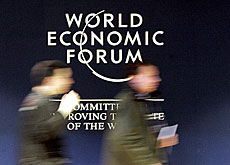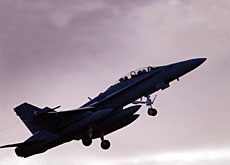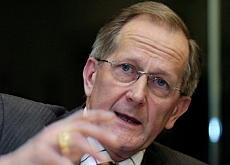WEF takes stock of new world order

Business and political leaders are set to grapple with rapid global change at the annual World Economic Forum meeting in Davos, which opens on Wednesday.
High on the agenda at the five-day forum are the risks and opportunities posed by the emergence of China and India and the revolution in new technologies.
For its 36th annual meeting the Geneva-based WEF has rounded up 2,340 participants to chew over a list of concerns ranging from Iran’s nuclear ambitions and Iraq through to high oil prices and the current-account deficit in the United States.
Of these, 735 are chief executives or chairmen – the strongest line-up from the business world since the WEF was launched in 1971.
A current preoccupation for many of them is the increasing economic power of China and India – a topic that WEF founder Klaus Schwab has given top billing.
“For me the key issue is the shift of the gravity centre from the West to the East: the rise of China and India not as a threat but as an opportunity, and all the consequences this has geo-economically and geopolitically,” the former Geneva University professor said ahead of the meeting.
The two Asian powerhouses will be sending big delegations to the forum: China will be represented by vice-premier Zeng Peiyan and India by Finance Minister Palaniappan Chidambaram.
Creative thinking
According to Schwab, the emphasis at this year’s meeting, which takes place under the banner “The Creative Imperative”, is on innovative solutions to the world’s problems.
“Neither governments, nor business, nor civil society can really solve the issues which we have on the global agenda alone,” he said.
Germany’s new chancellor, Angela Merkel, is set to open the forum. She will be joined by 14 other heads of state or government, including Ellen Johnson-Sirleaf, the newly elected president of Liberia, and Swiss President Moritz Leuenberger.
He will be accompanied by three of his cabinet colleagues: Foreign Minister Micheline Calmy-Rey, Finance Minister Hans-Rudolf Merz and Economics Minister Joseph Deiss.
Deiss, who has just returned from a five-day visit to India, will host an informal meeting of around 30 ministers to review stuttering world trade talks. He is also due to discuss the feasibility of a free-trade accord with his US counterpart Robert Portman.
Swiss contingent
Joining the Swiss political elite in the mountain resort will be the cream of the country’s business community: among them Peter Brabeck, chairman and chief executive of Nestlé, Marcel Ospel, chairman of UBS, and Daniel Vasella, chairman and CEO of Novartis.
They will be rubbing shoulders with the likes of Bill Gates, chairman of Microsoft, Sergey Brin and Larry Page, co-founders and presidents of Google, and billionaire financier George Soros.
Hollywood actress and United Nations refugee ambassador Angelina Jolie and U2 rocker Bono will be on hand to ensure photographers have something other than suits to aim at. And this year the world of sport also has a seat at the Davos table, with Fifa president Joseph Blatter, Pelé and Muhammad Ali on the team sheet.
Around 5,500 members of the army and air force will maintain security at an estimated cost of around SFr8.5 million ($6.75 million).
swissinfo with agencies
The five-day WEF meeting is expected to attract 2,340 participants from around 90 countries.
The line-up includes 15 heads of state or government, 60 cabinet ministers, 21 ambassadors, and 65 heads or senior officials of international organisations.
More than 490 participants come from civil society, including 31 heads of non-governmental organisations, 13 union leaders and 23 religious leaders.
Key themes at the meeting include the emergence of China and India, the changing economic landscape, the impact of technology and digitalisation, and building trust in leaders and institutions.
Leading global figures in Davos include UN Secretary-General Kofi Annan; Paul Wolfowitz, president of the World Bank; German Chancellor Angela Merkel; and Nobel peace prize-winner Mohamed ElBaradei, director-general of the International Atomic Energy Agency.

In compliance with the JTI standards
More: SWI swissinfo.ch certified by the Journalism Trust Initiative










You can find an overview of ongoing debates with our journalists here . Please join us!
If you want to start a conversation about a topic raised in this article or want to report factual errors, email us at english@swissinfo.ch.